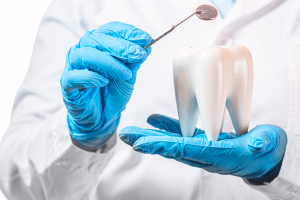

The sight of a coated tongue is unappealing. The thin layer may appear in patches or cover the whole tongue. Often accompanied by bad breath and tongue irritation, the condition can be uncomfortable. But fret not, a majority of the cases are harmless and temporary with the best coated tongue treatment being linked to its causes.
Understanding the Condition of Coated Tongue
The coated tongue meaning in medical terminology is discolouration of the tongue. It is usually a sign of bacterial growth, leftover food particles, and accumulation of dead skin cells within the tiny bumps on the tongue’s surface, called papillae. While most cases of coated tongue are harmless, a few may be progressive and alarming.
Types of Coated Tongue
A coated tongue is divided into two types depending upon the colour of the tongue – yellow coated tongue and white coated tongue. While the yellow coated tongue is primarily dead cell accumulation and staining due to food and tobacco consumption, the white coated tongue may have medical links.
What Causes a Coated Tongue?
Once you notice a coated tongue, it’s natural to feel concerned about the coated tongue causes. Interestingly, there isn’t always one underlying cause of coated tongue, and typically involves more than one cause.
- Poor Oral Hygiene – Improper or infrequent brushing and flossing allows food particles to remain inside the mouth. Bacterial and fungal growth on the foods leads to a coated tongue.
- Smoking, Vaping, Tobacco Chewing, or Dipping – The harmful effects of nicotine alter the oral microbiome, providing a helpful environment for bacterial growth.
- Alcohol Intake – Do you know alcohol is a diuretic? Its use leads to dehydration which reduces the production of saliva in the mouth. This leads to more dead cells and a favourable environment for bacterial growth.
- Use of Dentures – While the use of dentures does not directly cause tongue discoloration, poor hygiene, and dry mouth aggravate the problem. Tongue and lip piercings are oral traumas that increase the risk.
- Medications Like Antibiotics – The use of antibiotics for any medical condition alters the oral microbiome. This allows the yeast infection to thrive in the mouth.
- Low Intake Of Fruits and Vegetables – Chewing fruits and raw vegetables acts as a natural scrub for the inner lining of the mouth. This helps remove dead cell accumulation.
- Medical Conditions – People suffering from conditions like jaundice, hypothyroidism, and diabetes are at an increased risk of white tongue due to their poor immune response.
- Breathing Through Mouth – Mouth breathers invariably suffer from dry and low saliva production. This increases bacterial growth in the mouth.
- Weak Immune System – A weak immune system increases susceptibility to infections.
- Cancer Treatment – Chemotherapy and radiation therapy weaken the immune system, cause dry mouth, and bring about changes in the healthy oral microbial environment.
- Oral Health Conditions – White tongue is also linked to oral health conditions like geographic tongue, leukoplakia, oral lichen planus, oral thrush, and syphilis. In rare cases, white coated tongue is a result of tongue cancer.
How to Care for and Treat Coated Tongue?
The good part of a coated tongue is that it is a curable condition. In most cases, the condition will settle with proper oral health care and alterations in dietary and lifestyle habits. However, the coated tongue treatment for cases that have deeper roots will depend upon the underlying cause.
The first line of treatment for coated tongue includes:
- Increase water intake
- Brush twice a day with a soft toothbrush
- Use a tongue scraper to scrub the white coating
- Use of mild fluoride toothpaste
- Rinse your mouth with a fluoride mouthwash
- Avoid both cigarettes and e-cigarettes
- Cut back on alcohol
Do You Need to See a Doctor for Coated Tongue?
Fortunately, most cases of coated tongue settle on their own. But if the home remedies for coated tongue show no respite or the tongue coating resurfaces every few days, it might be a cause of concern. It is also advisable to see a doctor if you experience any of the following symptoms along with a white coated tongue.
- Painful or burning sensation on the tongue
- Any visible open sores in the mouth
- Experiencing trouble and pain while chewing, swallowing, or talking
- Oral rash
Conclusion
A coated tongue may be a benign condition, but its appearance is bad and typically unappealing. The discoloration of the tongue may make it appear yellowish or white. In both cases, oral hygiene is important to keep you safe from unwanted growth. And it is always good to have an oral examination every 6 months. An expert checkup can help figure out the exact coated tongue causes and prescribe the most appropriate coated tongue treatment for fast relief.




